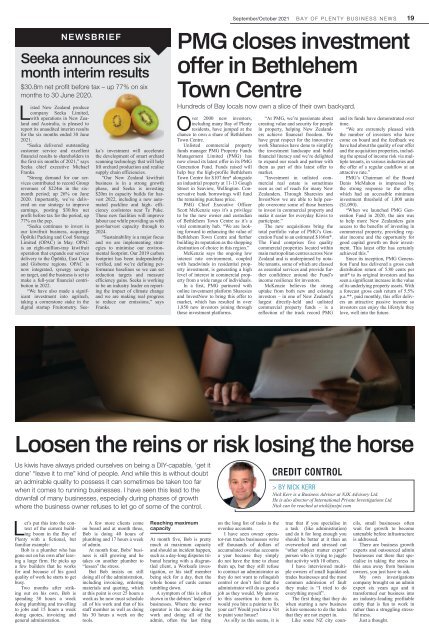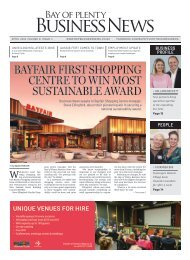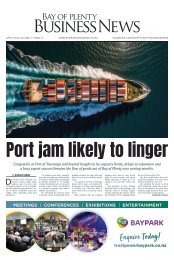September/October 2021 - Bay of Plenty Business News
From mid-2016 Bay of Plenty businesses have a new voice, Bay of Plenty Business News. This new publication reflects the region’s growth and importance as part of the wider central North Island economy.
From mid-2016 Bay of Plenty businesses have a new voice, Bay of Plenty Business News. This new publication reflects the region’s growth and importance as part of the wider central North Island economy.
Create successful ePaper yourself
Turn your PDF publications into a flip-book with our unique Google optimized e-Paper software.
<strong>September</strong>/<strong>October</strong> <strong>2021</strong> BAY OF PLENTY BUSINESS NEWS 19<br />
NEWSBRIEF<br />
Seeka announces six<br />
month interim results<br />
$30.8m net pr<strong>of</strong>it before tax – up 77% on six<br />
months to 30 June 2020.<br />
Listed New Zealand produce<br />
company Seeka Limited,<br />
with operations in New Zealand<br />
and Australia, is pleased to<br />
report its unaudited interim results<br />
for the six months ended 30 June<br />
<strong>2021</strong>.<br />
“Seeka delivered outstanding<br />
customer service and excellent<br />
financial results to shareholders in<br />
the first six months <strong>of</strong> <strong>2021</strong>,” says<br />
Seeka chief executive Michael<br />
Franks.<br />
“Strong demand for our services<br />
contributed to record Group<br />
revenues <strong>of</strong> $224m in the sixmonth<br />
period; up 26% on June<br />
2020. Importantly, we’ve delivered<br />
on our strategy to improve<br />
earnings, posting $30.8m net<br />
pr<strong>of</strong>it before tax for the period, up<br />
77% on the pcp.<br />
“Seeka continues to invest in<br />
our kiwifruit business, acquiring<br />
Ōpōtiki Packing and Cool Storage<br />
Limited (OPAC) in May. OPAC<br />
is an eight-million-tray kiwifruit<br />
operation that expands our service<br />
delivery to the Ōpōtiki, East Cape<br />
and Gisborne regions. OPAC is<br />
now integrated, synergy savings<br />
on target, and the business is set to<br />
make a full-year financial contribution<br />
in 2022.<br />
“We have also made a significant<br />
investment into agritech,<br />
taking a cornerstone stake in the<br />
digital startup Fruitometry. Seeka’s<br />
investment will accelerate<br />
the development <strong>of</strong> smart orchard<br />
scanning technology that will help<br />
lift orchard production and realise<br />
supply chain efficiencies.<br />
“Our New Zealand kiwifruit<br />
business is in a strong growth<br />
phase, and Seeka is investing<br />
$20m in capacity builds for harvest<br />
2022, including a new automated<br />
packline and high- efficiency<br />
coolstores near Te Puke.<br />
These new facilities will improve<br />
labour use while providing us with<br />
post-harvest capacity through to<br />
2024.<br />
“Sustainability is a major focus<br />
and we are implementing strategies<br />
to minimise our environmental<br />
footprint. Our 2019 carbon<br />
footprint has been independently<br />
verified, and we’re defining performance<br />
baselines so we can set<br />
reduction targets and measure<br />
efficiency gains. Seeka is working<br />
to be an industry leader on reporting<br />
the impact <strong>of</strong> climate change<br />
and we are making real progress<br />
to reduce our emissions,” says<br />
Franks.<br />
PMG closes investment<br />
<strong>of</strong>fer in Bethlehem<br />
Town Centre<br />
Hundreds <strong>of</strong> <strong>Bay</strong> locals now own a slice <strong>of</strong> their own backyard.<br />
Over 2000 new investors,<br />
including many <strong>Bay</strong> <strong>of</strong> <strong>Plenty</strong><br />
residents, have jumped at the<br />
chance to own a share <strong>of</strong> Bethlehem<br />
Town Centre.<br />
Unlisted commercial property<br />
funds manager PMG Property Funds<br />
Management Limited (PMG) has<br />
now closed its latest <strong>of</strong>fer in its PMG<br />
Generation Fund. Funds raised will<br />
help buy the high-pr<strong>of</strong>ile Bethlehem<br />
Town Centre for $107.6m* alongside<br />
an industrial property at 11-13 Gough<br />
Street in Seaview, Wellington. Conservative<br />
bank borrowings will fund<br />
the remaining purchase price.<br />
PMG Chief Executive Officer<br />
Scott McKenzie says it’s a privilege<br />
to be the new owner and custodian<br />
<strong>of</strong> Bethlehem Town Centre as it’s a<br />
vital community hub. “We are looking<br />
forward to enhancing the value <strong>of</strong><br />
Bethlehem Town Centre and further<br />
building its reputation as the shopping<br />
destination <strong>of</strong> choice in this region.”<br />
McKenzie says the ongoing low<br />
interest rate environment, coupled<br />
with headwinds in residential property<br />
investment, is generating a high<br />
level <strong>of</strong> interest in commercial property<br />
from a wide range <strong>of</strong> individuals.<br />
In a first, PMG partnered with<br />
online investment platform Sharesies<br />
and InvestNow to bring this <strong>of</strong>fer to<br />
market, which has resulted in over<br />
1,850 new investors joining through<br />
these investment platforms.<br />
“At PMG, we’re passionate about<br />
creating value and security for people<br />
in property, helping New Zealanders<br />
achieve financial freedom. We<br />
have great respect for the innovative<br />
work Sharesies have done to simplify<br />
the investment landscape and build<br />
financial literacy and we’re delighted<br />
to expand our reach and partner with<br />
them as part <strong>of</strong> this latest <strong>of</strong>fer to<br />
market.<br />
“Investment in unlisted commercial<br />
real estate is sometimes<br />
seen as out <strong>of</strong> reach for many New<br />
Zealanders. Through Sharesies and<br />
InvestNow we are able to help people<br />
overcome some <strong>of</strong> those barriers<br />
to invest in commercial property and<br />
make it easier for everyday Kiwis to<br />
participate.”<br />
The new acquisitions bring the<br />
total portfolio value <strong>of</strong> PMG’s Generation<br />
Fund to an estimated $166m*.<br />
The Fund comprises five quality<br />
commercial properties located within<br />
main metropolitan centres across New<br />
Zealand and is underpinned by notable<br />
tenants, some <strong>of</strong> which are classed<br />
as essential services and provide further<br />
confidence around the Fund’s<br />
income resilience for investors.<br />
McKenzie believes the strong<br />
uptake from both new and existing<br />
investors – in one <strong>of</strong> New Zealand’s<br />
largest directly-held and unlisted<br />
commercial property funds – is a<br />
reflection <strong>of</strong> the track record PMG<br />
and its funds have demonstrated over<br />
time.<br />
“We are extremely pleased with<br />
the number <strong>of</strong> investors who have<br />
come on board and the feedback we<br />
have had about the quality <strong>of</strong> our <strong>of</strong>fer<br />
and the acquisition properties, including<br />
the spread <strong>of</strong> income risk via multiple<br />
tenants, in various industries and<br />
the <strong>of</strong>fer <strong>of</strong> a regular cashflow at an<br />
attractive rate.”<br />
PMG’s Chairman <strong>of</strong> the Board<br />
Denis McMahon is impressed by<br />
the strong response to the <strong>of</strong>fer,<br />
which had an accessible minimum<br />
investment threshold <strong>of</strong> 1,000 units<br />
($1,090).<br />
“When we launched PMG Generation<br />
Fund in 2020, the aim was<br />
to help more New Zealanders gain<br />
access to the benefits <strong>of</strong> investing in<br />
commercial property, providing regular<br />
income and the opportunity for<br />
good capital growth on their investment.<br />
This latest <strong>of</strong>fer has certainly<br />
achieved this.”<br />
Since its inception, PMG Generation<br />
Fund has delivered a gross cash<br />
distribution return <strong>of</strong> 5.80 cents per<br />
unit* to its original investors and has<br />
seen a significant increase in the value<br />
<strong>of</strong> its underlying property assets. With<br />
a forecast gross cash return <strong>of</strong> 5.5%<br />
p.a.**, paid monthly, this <strong>of</strong>fer delivers<br />
an attractive passive income so<br />
investors can enjoy the lifestyle they<br />
love, well into the future.<br />
Loosen the reins or risk losing the horse<br />
Us kiwis have always prided ourselves on being a DIY-capable, ‘get it<br />
done’ “leave it to me” kind <strong>of</strong> people. And while this is without doubt<br />
an admirable quality to possess it can sometimes be taken too far<br />
when it comes to running businesses. I have seen this lead to the<br />
downfall <strong>of</strong> many businesses, especially during phases <strong>of</strong> growth<br />
where the business owner refuses to let go <strong>of</strong> some <strong>of</strong> the control.<br />
CREDIT CONTROL<br />
> BY NICK KERR<br />
Nick Kerr is a <strong>Business</strong> Advisor at NJK Advisory Ltd.<br />
He is also director <strong>of</strong> International Private Investigations Ltd.<br />
Nick can be reached at nick@nzipi.com<br />
Let’s put this into the context<br />
<strong>of</strong> the current building<br />
boom in the <strong>Bay</strong> <strong>of</strong><br />
<strong>Plenty</strong> with a fictional, but<br />
familiar example:<br />
Bob is a plumber who has<br />
gone out on his own after leaving<br />
a large firm. He picks up<br />
a few builders that he works<br />
for and because <strong>of</strong> his good<br />
quality <strong>of</strong> work he starts to get<br />
busy.<br />
Two months after striking<br />
out on his own, Bob is<br />
spending 30 hours a week<br />
doing plumbing and travelling<br />
to jobs and 15 hours a week<br />
doing quotes, invoicing and<br />
general administration.<br />
A few more clients come<br />
on board and at month three,<br />
Bob is doing 40 hours <strong>of</strong><br />
plumbing and 17 hours a week<br />
<strong>of</strong> admin.<br />
At month four, Bobs’ business<br />
is still growing and he<br />
takes on another plumber to<br />
“lessen” the stress.<br />
But Bob insists on still<br />
doing all <strong>of</strong> the administration,<br />
including invoicing, ordering<br />
materials and quoting, which<br />
at this point is over 25 hours a<br />
week as he now must schedule<br />
all <strong>of</strong> his work and that <strong>of</strong> his<br />
staff member as well as doing<br />
his 30 hours a week on the<br />
tools.<br />
Reaching maximum<br />
capacity<br />
At month five, Bob is pretty<br />
much at maximum capacity<br />
and should an incident happen,<br />
such as a day-long disputes tribunal<br />
hearing with a disgruntled<br />
client, a Worksafe investigation,<br />
or his staff member<br />
being sick for a day, then the<br />
whole house <strong>of</strong> cards comes<br />
tumbling down.<br />
A symptom <strong>of</strong> this is <strong>of</strong>ten<br />
shown in the debtors’ ledger <strong>of</strong><br />
businesses. Where the owner<br />
operator is the one doing the<br />
work and doing all <strong>of</strong> the<br />
admin, <strong>of</strong>ten the last thing<br />
on the long list <strong>of</strong> tasks is the<br />
overdue accounts.<br />
I have seen owner operator-run<br />
trades businesses write<br />
<strong>of</strong>f thousands <strong>of</strong> dollars <strong>of</strong><br />
accumulated overdue accounts<br />
a year because they simply<br />
do not have the time to chase<br />
them up, but they still refuse<br />
to contract an administrator as<br />
they do not want to relinquish<br />
control or don’t feel that the<br />
administrator will do as good a<br />
job as they would. My answer<br />
to this assertion to them is,<br />
would you hire a painter to fix<br />
your car? Would you hire a Vet<br />
to paint your house?<br />
As silly as this seems, it is<br />
true that if you specialise in<br />
a task (like administration)<br />
and do it for long enough you<br />
should be better at it than an<br />
overworked and stressed out<br />
“other subject matter expert”<br />
person who is trying to juggle<br />
that activity with 10 others.<br />
I have interviewed multiple<br />
owners <strong>of</strong> small liquidated<br />
trades businesses and the most<br />
common admission <strong>of</strong> fault<br />
they make is “I tried to do<br />
everything myself”.<br />
The first thing that they do<br />
when starting a new business<br />
is hire someone to do the tasks<br />
that they are not expert in.<br />
Like some NZ city councils,<br />
small businesses <strong>of</strong>ten<br />
wait for growth to become<br />
untenable before infrastructure<br />
is addressed.<br />
There are business growth<br />
experts and outsourced admin<br />
businesses out there that specialise<br />
in taking the stress in<br />
this area away from business<br />
owners, you just have to ask.<br />
My own investigations<br />
company brought on an admin<br />
expert six years ago and it<br />
transformed our business into<br />
an industry-leading pr<strong>of</strong>itable<br />
entity that is fun to work in<br />
rather than a struggling stressful<br />
mess.<br />
Just a thought.

















